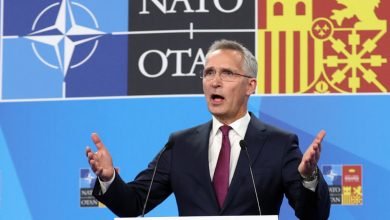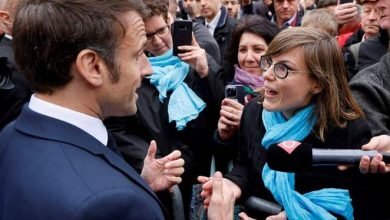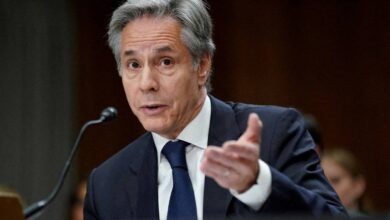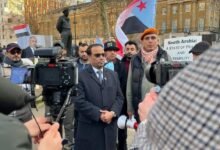international
Iran stands ground on nuclear inspections as France warns of red line
[su_label type=”info”]SMA News – Agencies [/su_label][su_spacer size=”10″] Iran will not cooperate more fully with atomic inspectors until a standoff over its nuclear deal is resolved, its U.N. envoy said, as one signatory warned Tehran against moving ahead with preparations to boost its uranium enrichment capacity.
Tehran meanwhile signaled its resolve to expand its enrichment capability by detailing plans to build advanced centrifuges – the machines that enrich uranium.
European powers have been scrambling to salvage the agreement they signed in 2015 since U.S. President Donald Trump pulled Washington out last month and said he would reimpose far-reaching U.S. sanctions on Iran.
Foreign and finance ministers from those three countries – France, Britain and Germany – have written to U.S. officials to stress their commitment to upholding the pact, and to urge Washington to spare EU firms active in Iran from secondary sanctions.
An Iranian withdrawal from the deal, which lifted sanctions on Tehran in exchange for curbs on its nuclear program, would “further unsettle a region where additional conflicts would be disastrous,” the ministers wrote in the letter dated June 4 and seen by Reuters on Wednesday.
Since the U.S. pullout was announced, authorities in Tehran have sent mixed signals on whether they believe the nuclear deal’s remaining signatories, which also include China and Russia, can salvage it.
Supreme Leader Ayatollah Khamenei said on Monday he had ordered preparations to increase uranium enrichment capacity if the agreement collapsed.
Tehran also informed the International Atomic Energy Agency (IAEA), the U.N. nuclear watchdog that polices restrictions placed on its activities under the deal, of “tentative” plans to produce the feedstock for centrifuges.
In Paris on Wednesday, French Foreign Minister Yves Le Drian told Europe 1 radio that, while that initiative remained within the framework of the nuclear deal, it was unwelcome and risked sailing close to a “red line”.
U.S. Secretary of State Mike Pompeo said on Twitter that Washington was aware of reports Iran plans to increase its uranium enrichment and he vowed not to allow Tehran to develop a nuclear weapon. “Iran is aware of our resolve,” he said.
Emphasizing that Tehran’s patience with European efforts to save the deal was not unlimited, its envoy to the IAEA said it had granted the three powers a few weeks.
“A few weeks means a few weeks, not a few months,” Reza Najafi said outside a quarterly meeting of the agency’s Board of Governors in Vienna.
Tehran meanwhile signaled its resolve to expand its enrichment capability by detailing plans to build advanced centrifuges – the machines that enrich uranium.
European powers have been scrambling to salvage the agreement they signed in 2015 since U.S. President Donald Trump pulled Washington out last month and said he would reimpose far-reaching U.S. sanctions on Iran.
Foreign and finance ministers from those three countries – France, Britain and Germany – have written to U.S. officials to stress their commitment to upholding the pact, and to urge Washington to spare EU firms active in Iran from secondary sanctions.
An Iranian withdrawal from the deal, which lifted sanctions on Tehran in exchange for curbs on its nuclear program, would “further unsettle a region where additional conflicts would be disastrous,” the ministers wrote in the letter dated June 4 and seen by Reuters on Wednesday.
Since the U.S. pullout was announced, authorities in Tehran have sent mixed signals on whether they believe the nuclear deal’s remaining signatories, which also include China and Russia, can salvage it.
Supreme Leader Ayatollah Khamenei said on Monday he had ordered preparations to increase uranium enrichment capacity if the agreement collapsed.
Tehran also informed the International Atomic Energy Agency (IAEA), the U.N. nuclear watchdog that polices restrictions placed on its activities under the deal, of “tentative” plans to produce the feedstock for centrifuges.
In Paris on Wednesday, French Foreign Minister Yves Le Drian told Europe 1 radio that, while that initiative remained within the framework of the nuclear deal, it was unwelcome and risked sailing close to a “red line”.
U.S. Secretary of State Mike Pompeo said on Twitter that Washington was aware of reports Iran plans to increase its uranium enrichment and he vowed not to allow Tehran to develop a nuclear weapon. “Iran is aware of our resolve,” he said.
Emphasizing that Tehran’s patience with European efforts to save the deal was not unlimited, its envoy to the IAEA said it had granted the three powers a few weeks.
“A few weeks means a few weeks, not a few months,” Reza Najafi said outside a quarterly meeting of the agency’s Board of Governors in Vienna.







